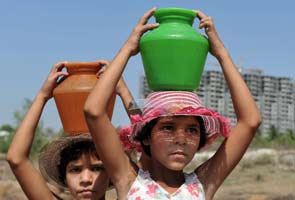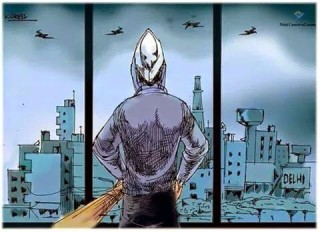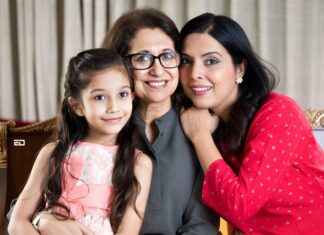Aam Aadmi Party which truly needs no introduction is battling internal conflicts and power struggles which is disheartening to observe as Delhites wage a tiresome battle against inadequate water supply, untimely power cuts when Delhi’s brutal summer has just but begun. Extremely sorry people, am here not to bash politicians but to direct their attention to the dismal state of water and sanitation facility of Delhi. Sadly, though Delhi is befitting of an economic powerhouse India’s capital yet its water quality and wastewater treatment services represents that of a banana republic.

Millennium Development Goals (MDGs) adopted by the largest ever gathering of World leaders in 2000 were adopted as an integrated set of time bound targets for extending the benefits of globalization to the world’s poorest citizens and making real progress, by 2015. At that time, special emphasis was laid on water and sanitation and the decade 2005-15 was recognized the International Decade for Action ‘Water for Life’ 2005-2015.
It was supposed to be a decade in which the proportion of people without sustainable access to safe drinking water and basic sanitation was to be halved yet still, 334 million people in India itself do not have access to safe water supply out of which 8.376 million people living in NCR (nearly 50% of Delhi’s population) are also included.

Drinking water scarcity, poor water quality, lack of sanitation facility affect livelihood choices, education opportunity for the underprivileged families across our country and the developing world in general. The opportunity cost that an economy has to pay thus in terms of lost productivity is far too much in comparison to the costs incurred for providing sustainable infrastructure for water.
Indeed, as the recurrent flooding in Mumbai, come monsoon underlines time and again that instead of estimating what it costs to provide drinking water (and drainage) in a city, the authorities ought to calculate what it costs [I]not[/I] to provide such basic amenities, including sanitation. According to Marie-Helene Zerah, who has published a book titled ‘Water: Unreliable Supply in Delhi’. “The unreliability of water supply costs Delhi Rs 3 billion annually, that is double the municipal expenditure on water.”
If really inadequacy of water takes such a heavy toll on a State’s economy, then why isn’t anything being done regarding this matter? The simplest answer can be that the authorities like to throw at our faces is that Delhi does not have enough water. That, Delhi is dependent on neighbouring states for its water supply, that Delhi’s population density is too high and on and on and on.
All of the above mentioned points are simply excuses fancily packaged in the form of reasons and justifications. They all have a degree of truth in them but all of them simply make a pathetic attempt to hide how none of our political leaders have natural resources figuring in their plans for economic growth. An example is that Mrs. Sheila Dixit ruled Delhi for 15 years and was once heard complaining (before her tenure, obviously) that the Delhi Jal Board(DJB) had “20,000 unsackable employees.” However, during nearly the 15 years she was in power, neither she nor her party had the desire, courage or vision to restructure an incompetent and inefficient DJB. Delhi Jal Board’s sole purpose of existence is to provide Delhi with good quality water and wastewater treatment services. A State funded body from taxpayer’s hard earned money does not exist for the benefit of its employees or the vested interests of those that profit from a poor man’s thirst and desperation.

When the long-suffering residents of Delhi thought their water situation could not get any worse, out came AAP, broom in hand, led by none but the Muffler-man himself! With a policy designed to appease and fatten the lamb before it gets slaughtered, AAP’s policy of providing free of cost water to existing DJB’s customer will prove to be a disaster in the long run.

Now, DJB mandated by AAP to provide 670 litres of water per day to each connected household free of cost actually means that DJB has to pump 1,005 litres of water to each household, this is because the Board now loses 45 to 55 percent of the water from the system. Sadly enough, this isn’t just a roadmap for a financial disaster in the making for Delhi State Government Exchequer but a seal on fate of the thousands of households who are yet to see a piped water connection to their homes. For all the euphoric electoral promises of AAP, they are still dependent on whims of private tankers contracters even for their drinking water supply.
How thick can AAP be if it fails to see that its simply subsidizing the middle class and the rich class’ water bill at the cost of economic upliftment of the poor. It is also going against the tenets of Millenium Development Goal aforementioned which states that “Governments and utilities must ensure that users who can pay do pay in order to fund the operation, maintenance, and expansion of services—but they must also ensure that the needs of poor households are met.”
To ensure a good sustainable model in financial and water conservation terms, each household must pay for water which should not exceed two per cent of the household income. Any subsidy must be specifically targeted only to the poor.
To conclude, its time that the general public sees through the inefficiency of public utility management system such as water and demand what is a basic human right, for water is not just a commodity but a human right recognized by Honorable Supreme Court a part of ‘Right to Life’ under Article 21 of the Constitution of India as well as the United Nations Committee on Economic, Social and Cultural Rights (‘CESCR’).
Picture Credits: Google Images
































